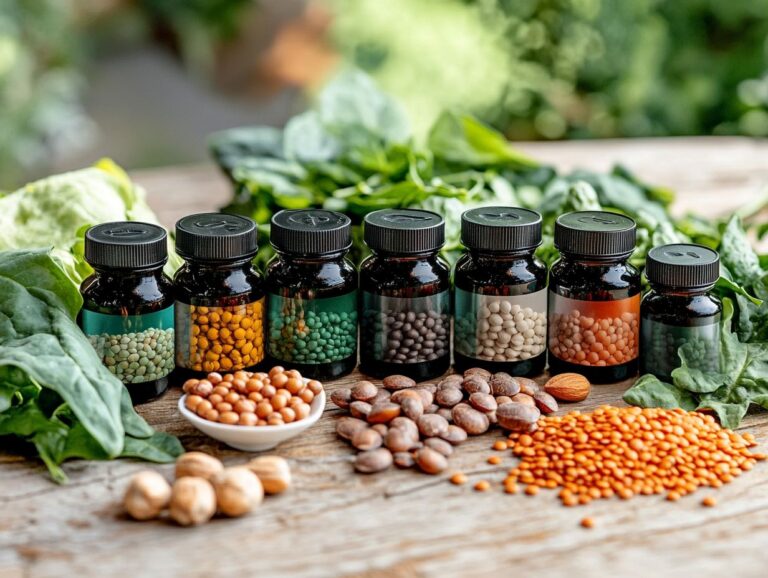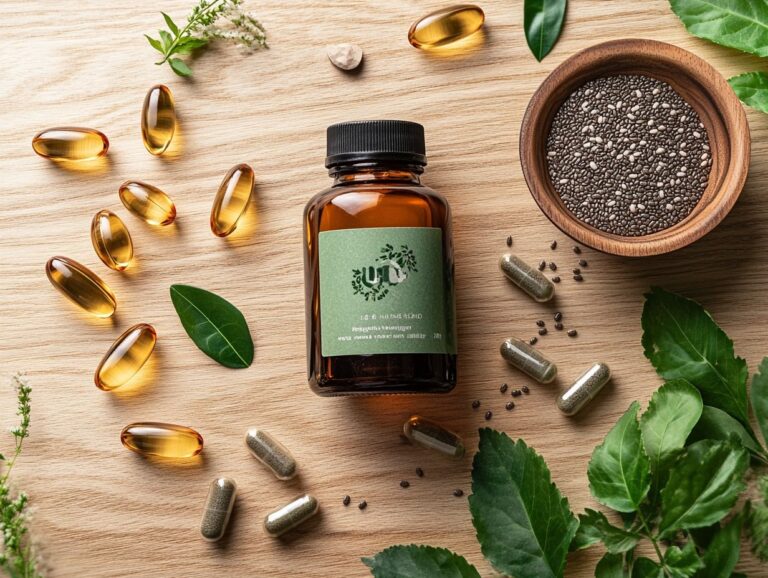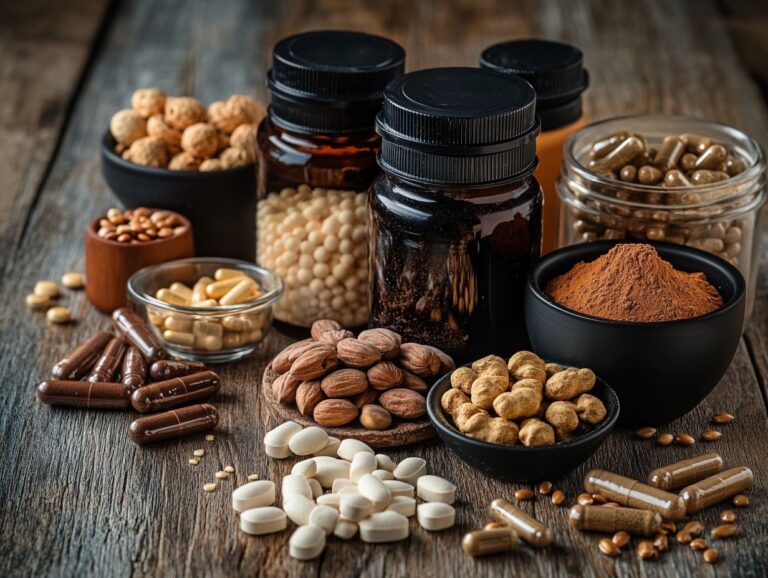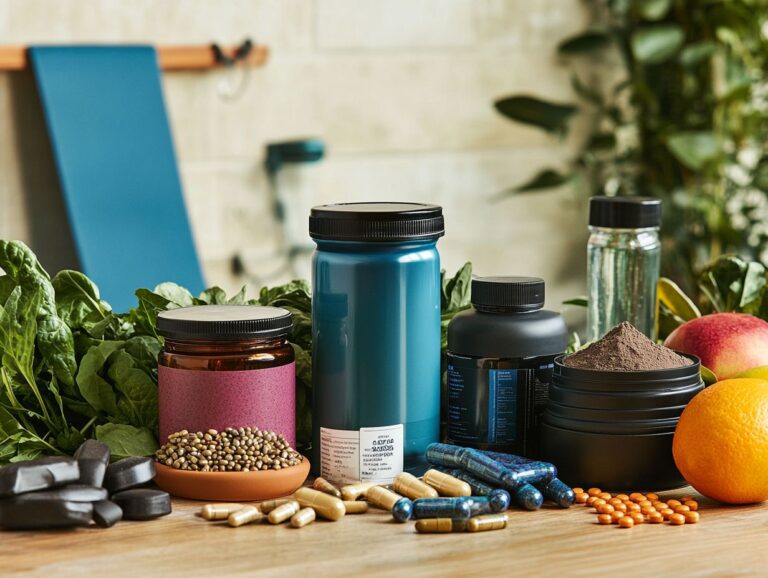Embracing a vegan diet can be a rewarding and health-conscious decision; however, it also presents unique nutritional challenges. While plant-based foods are rich in many nutrients, certain essential vitamins and minerals may be more difficult to obtain. This article examines the key components of a vegan diet and emphasizes the importance of supplements for vegans. It highlights essential nutrients such as vitamin B12, iron, calcium, and more. Additionally, the article offers guidance on selecting the appropriate supplements and discusses potential risks, ensuring that you can thrive on your vegan journey.
Key Takeaways:
- Vegans may need supplements to ensure adequate intake of essential nutrients.
- The top supplements for a healthy vegan lifestyle include B12, iron, calcium, vitamin D, and omega-3 fatty acids.
- When choosing vegan supplements, look for certified vegan labels, third-party certifications, and consider individual needs to avoid potential risks.
What Is a Vegan Diet?
 A vegan diet is a plant-based dietary regimen that excludes all animal products, including meat, dairy, and eggs. This diet emphasizes whole foods such as fruits, vegetables, grains, legumes, nuts, and seeds, offering a wide range of health benefits, from improved heart health to a reduced risk of chronic diseases. It additionally provides essential nutrients required for maintaining a healthy thyroid and meeting daily nutrient requirements. However, adopting a vegan diet often requires careful planning to ensure that daily nutrient needs are met and that all essential nutrients are adequately consumed.
A vegan diet is a plant-based dietary regimen that excludes all animal products, including meat, dairy, and eggs. This diet emphasizes whole foods such as fruits, vegetables, grains, legumes, nuts, and seeds, offering a wide range of health benefits, from improved heart health to a reduced risk of chronic diseases. It additionally provides essential nutrients required for maintaining a healthy thyroid and meeting daily nutrient requirements. However, adopting a vegan diet often requires careful planning to ensure that daily nutrient needs are met and that all essential nutrients are adequately consumed.
Why Do Vegans Need Supplements?
Vegans often require supplements to meet specific dietary needs and prevent potential nutrient deficiencies. Key vitamins and minerals that are particularly important for those following a vegan diet include:
- Vitamin B12
- Vitamin D
- Calcium
- Omega-3 fatty acids
- Zinc
- Iodine
These nutrients are either absent in plant-based foods or have lower bioavailability compared to those found in animal-derived sources. Hence, using dietary supplements, such as vegan multivitamins, may help to bridge nutrient gaps and support daily intake needs.
What Are the Essential Nutrients for Vegans?
Essential nutrients for vegans include vitamin B12, iron, calcium, vitamin D, and omega-3 fatty acids, all of which are crucial for maintaining good health. While a well-balanced vegan diet can provide many of these nutrients, individuals should monitor their intake and consider incorporating fortified foods or supplements as needed to meet their daily requirements. Pregnant women and lactating women have specific supplement needs and may require additional dietary supplements to support their health.
1. Vitamin B12
Vitamin B12 is crucial for the proper functioning of the nervous system, energy metabolism, and the formation of red blood cells. It is found almost exclusively in animal products, which makes individuals following a vegan diet more susceptible to B12 deficiency. Additionally, vitamin B12 is essential for protein metabolism, underscoring the need for careful dietary planning and supplement advice. Adequate blood levels of B12 can be maintained through the consumption of fortified foods and/or supplements, as long-term deficiencies can lead to irreversible damage. Recent studies have indicated that some people on a plant-based diet may even have higher levels of B12 compared to meat-eaters, as they tend to be more mindful of the importance of regular supplementation and fortified products. For those adhering to a plant-based diet, it is important to recognize various sources of B12. Fortified plant milks, breakfast cereals, and nutritional yeast are among the most effective and delicious ways to meet vitamin B12 requirements. The recommended daily intake for adults is 2.4 micrograms, although some individuals may need up to 1,000 times more, particularly those with absorption issues or specific dietary restrictions. Vitamin B12 deficiency can result in irreversible neurological problems as well as anemia, underscoring the importance of regular monitoring and necessary adjustments to diets and supplementation plans. Health practitioners suggest recommended doses tailored to individual dietary needs.
2. Iron
Iron is an essential mineral for oxygen transport and energy metabolism, making it crucial for vegans to ensure they obtain adequate iron intake. Monitoring iron-rich foods and consulting health practitioners for dietary recommendations can help manage potential deficiencies. Since non-heme iron (plant-based) is less bioavailable than heme iron (animal-based), vegans should consume larger quantities of iron-rich foods, such as legumes, soy products like tofu and tempeh, and dark leafy greens, along with vitamin C to enhance absorption. To further boost iron levels in a vegan diet, individuals can include iron-rich foods such as:
- Quinoa
- Seeds like pumpkin or sesame
- Dried fruits
Cooking methods such as boiling or steaming can also improve the availability of non-heme iron. Pairing these with vitamin C-rich foods can also enhance iron absorption. Additionally, being aware of the presence of phytates and tannins in certain grains and teas, which can inhibit absorption, is helpful; timing the consumption of these foods may enhance iron intake. Regularly monitoring iron levels through dietary adjustments and possibly supplementation especially for those with specific dietary restrictions or increased needs can significantly improve overall health and well-being. Blood tests can assist in identifying nutrient deficiencies and customizing supplement regimens.
3. Calcium
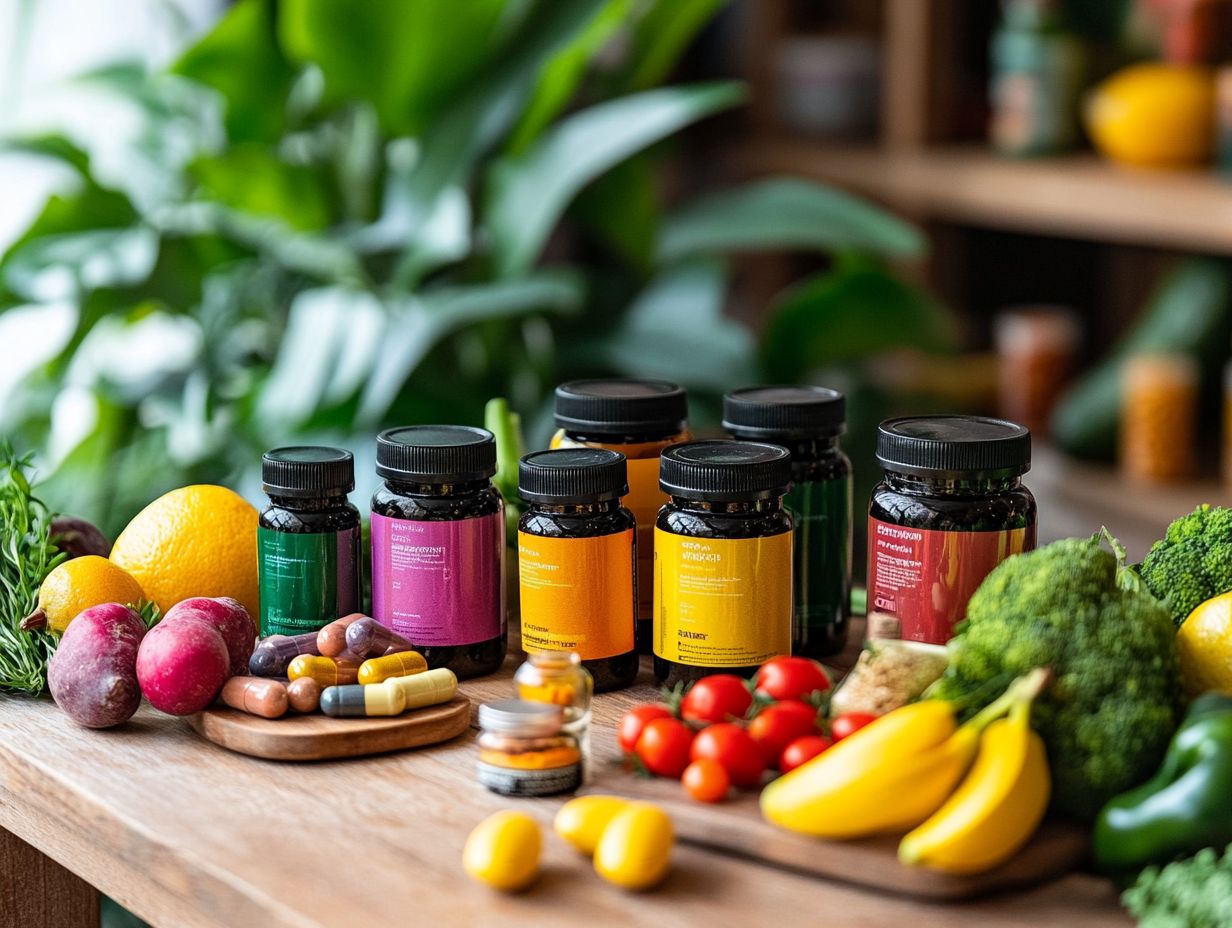 Calcium is an essential mineral that plays a crucial role in bone health, muscle function, and overall well-being. It is particularly important for vegans to meet the recommended dietary allowance (RDA) for calcium through plant-based sources. Insufficient calcium intake can lead to deficiencies, resulting in weaker bones and various health issues over time. Supplement needs may vary based on individual health conditions and lifestyle factors. Vegans can include a variety of calcium-rich plant foods in their diets, such as tofu, chia seeds, and fortified juices, to ensure they receive adequate amounts of this vital nutrient. The RDA for calcium varies by age and gender, highlighting the importance of careful dietary planning. By being mindful of these sources and pairing them with vitamin D to enhance absorption, vegans can effectively support their health while enjoying a diverse, plant-based diet. Calcium citrate supplements may also support calcium absorption and help meet the RDA for calcium.
Calcium is an essential mineral that plays a crucial role in bone health, muscle function, and overall well-being. It is particularly important for vegans to meet the recommended dietary allowance (RDA) for calcium through plant-based sources. Insufficient calcium intake can lead to deficiencies, resulting in weaker bones and various health issues over time. Supplement needs may vary based on individual health conditions and lifestyle factors. Vegans can include a variety of calcium-rich plant foods in their diets, such as tofu, chia seeds, and fortified juices, to ensure they receive adequate amounts of this vital nutrient. The RDA for calcium varies by age and gender, highlighting the importance of careful dietary planning. By being mindful of these sources and pairing them with vitamin D to enhance absorption, vegans can effectively support their health while enjoying a diverse, plant-based diet. Calcium citrate supplements may also support calcium absorption and help meet the RDA for calcium.
4. Vitamin D
Vitamin D plays a crucial role in immune function, calcium absorption, and bone health. It is particularly important for vegans, as plant-based sources of vitamin D are limited and sunlight exposure may be restricted. Therefore, vegans are often advised to take vitamin D3 supplements or consume vitamin D3-fortified foods to ensure they maintain adequate vitamin D levels, especially during the winter months or in regions with limited sunlight. Regular blood tests can help monitor vitamin D levels and guide appropriate vitamin D supplementation. This vitamin is essential not only for immune function but also for reducing the risk of chronic diseases. Since vegan diets typically exclude the primary dietary sources of vitamin D, such as fatty fish and egg yolks, it is vital for individuals following a vegan diet to obtain vitamin D from fortified foods and vitamin D3 supplements:
- Fortified plant-based milk
- Fortified orange juice
- Fortified cereals
Regular monitoring of blood levels of vitamin D is important to prevent deficiency, and healthcare professionals can provide guidance on the appropriate amount of supplementation needed to achieve optimal health benefits. This includes addressing health conditions that may affect vitamin D absorption.
5. Omega-3 Fatty Acids
Omega-3 fatty acids are essential fats that contribute to heart health, brain function, and the reduction of inflammation, but they can be challenging to obtain from a vegan diet. While alpha-linolenic acid (ALA), a type of omega-3, is found in plant-based sources such as flaxseeds, chia seeds, and walnuts, the more bioavailable forms of omega-3, namely eicosapentaenoic acid (EPA) and docosahexaenoic acid (DHA), may need to be sourced from algae oil supplements for those following a vegan lifestyle. Understanding the differences between these various forms of omega-3 is crucial when planning an effective diet. This understanding helps in managing potential nutrient deficiencies and optimizing immune function. ALA is primarily derived from plant sources, while EPA and DHA are mainly obtained from fish and algae. To enhance ALA intake in a strictly vegan diet, incorporating foods such as hemp seeds and Brussels sprouts is recommended. These plant foods are great sources of essential omega-3 and support overall dietary needs. Additionally, high-quality algae oil supplements can help maximize the health benefits associated with omega-3s, including improved cognitive function and a reduced risk of heart disease. Regular consultation with health practitioners can provide personalized supplement advice.
What Are the Best Vegan Supplements?
The best vegan supplements address the most common nutrient deficiencies associated with a plant-based diet, such as vitamin B12, iron, calcium, vitamin D, omega-3 fatty acids, iodine, and zinc. Health professionals may recommend specific supplement regimens to meet individual needs and prevent health risks. By selecting high-quality and reputable supplements, individuals can enhance the health outcomes of their vegan diets and obtain essential nutrients that might otherwise be lacking. For instance, omega-3 sources like algae oil can provide essential omega-3 needed for optimal health benefits.
1. B12 Supplements
Vitamin B12 supplements are among the most commonly recommended items for vegans due to the crucial role of vitamin B12 in nerve function and energy metabolism, as well as the high risk of deficiency associated with plant-based diets. Incorporating nutritional yeast into meals can also help boost B12 intake naturally. These supplements are available in various forms, including tablets, sublingual options, and fortified foods, allowing for tailored recommendations based on individual needs. Health practitioners often emphasize the importance of selecting the appropriate form of B12, considering factors like individual absorption rates. For instance, some individuals may benefit more from sublingual tablets that dissolve under the tongue, enhancing bioavailability. Fortified foods, such as plant-based milks and cereals, offer an alternative way to increase B12 intake easily. They are part of a whole-food diet that aids in meeting nutrient needs. It is essential for individuals to consult with healthcare providers when determining the appropriate dosage, as insufficient B12 can lead to fatigue and neurological issues, while excessive amounts though rare can sometimes result in complications. Maintaining adequate B12 levels is important for everyone, regardless of their dietary background.
2. Iron Supplements
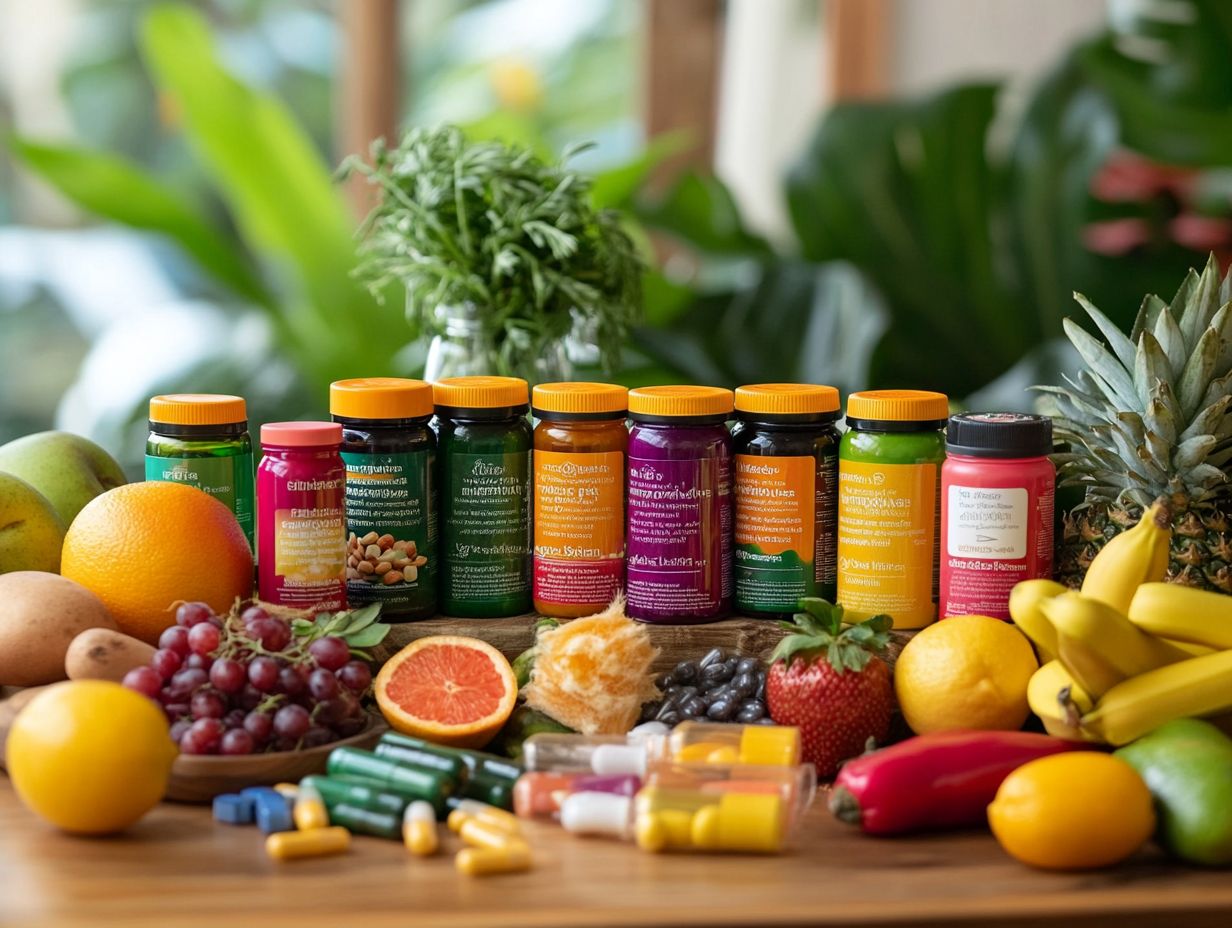 Iron supplements can be beneficial for vegans who struggle to meet their iron needs through a plant-based diet alone, especially for those with higher iron requirements, such as pregnant or lactating women. Regular bloodwork can help identify iron deficiencies and monitor iron supplementation, ensuring optimal health and energy levels. Including iron-rich foods and understanding daily nutrient needs are also crucial for maintaining energy levels. Iron supplements come in various forms, including:
Iron supplements can be beneficial for vegans who struggle to meet their iron needs through a plant-based diet alone, especially for those with higher iron requirements, such as pregnant or lactating women. Regular bloodwork can help identify iron deficiencies and monitor iron supplementation, ensuring optimal health and energy levels. Including iron-rich foods and understanding daily nutrient needs are also crucial for maintaining energy levels. Iron supplements come in various forms, including:
- ferrous sulfate
- ferrous gluconate
- ferrous fumarate
Each form contains different amounts of elemental iron and absorption rates. The effectiveness of these supplements may vary based on individual health factors, making regular blood tests essential for assessing the body’s iron levels. This information allows individuals to track their nutrient status and adjust their dietary intake and supplementation as necessary. Additionally, consuming iron-rich foods along with vitamin C can enhance absorption, highlighting the importance of a balanced diet for overall health. Fortified foods and nutritional yeast can also support a vegan lifestyle by providing essential nutrients like vitamin B12 and iodine, which are important for energy metabolism and a healthy thyroid.
3. Calcium Supplements
Vegans may need to consider calcium supplements if they are unable to meet the recommended dietary allowance (RDA) for calcium through food sources alone, especially if they are at risk for bone health disorders. Calcium supplements can help increase calcium absorption and support overall health in cases of inadequate dietary intake and meeting the RDA for calcium. There are various forms of calcium supplements available, including calcium carbonate and calcium citrate, each playing different roles in promoting health and addressing nutrient gaps. Calcium carbonate is the most commonly used form of calcium supplement and is recommended for its high elemental calcium content; it is best absorbed when taken with meals. In contrast, calcium citrate is more easily digested and does not require food for absorption, making it a suitable option for individuals with digestive issues. The typical recommended doses vary, with adults generally advised to target 1,000 to 1,200 mg per day, depending on age and gender. Choosing the right supplements can help individuals maintain optimal calcium levels, thereby promoting bone density, reducing the risk of osteoporosis, and improving overall cardiovascular health.
4. Vitamin D Supplements
Vitamin D supplements, particularly vitamin D3 derived from lichen, are recommended for vegans to maintain healthy levels of this essential vitamin, especially in areas with limited sunlight. These supplements support immune function and bone health, addressing potential nutrient deficiencies in a vegan lifestyle. Consulting with healthcare professionals can help determine whether supplementation is necessary and in what amounts. It is important to understand the different types of vitamin D available; vitamin D2 and vitamin D3 are two common forms, each with varying degrees of effectiveness. Many individuals may experience nutrient deficiencies due to insufficient sunlight or dietary restrictions, making supplementation beneficial for overall health. Vitamin D is crucial for healthy immune function, bone health, and mood regulation. Following dietary recommendations from reputable health authorities regarding vitamin D supplementation can help maintain adequate levels and prevent deficiencies that could lead to more serious health issues in the future.
5. Omega-3 Supplements
Omega-3 supplements, particularly those derived from algae oil, offer a vegan source of essential omega-3 fatty acids crucial for heart and brain health. These supplements can help vegans increase their alpha-linolenic acid (ALA) intake and ensure they maintain adequate levels of eicosapentaenoic acid (EPA) and docosahexaenoic acid (DHA) to support overall well-being and nutritional requirements. Including omega-3 fatty acids in a vegan diet is crucial, as these nutrients are known to play a significant role in reducing inflammation, improving mood, and enhancing cognitive function. While flaxseeds and chia seeds are recognized as good sources of ALA, they have a limited capacity to be converted into EPA and DHA. In contrast, algae oil provides a direct source of EPA and DHA, delivering the same benefits as fish oil without conflicting with dietary restrictions. Therefore, omega-3 supplements are particularly beneficial for vegans seeking to support their mental and heart health.
How to Choose the Right Vegan Supplements?
When selecting the best vegan supplements, several factors should be considered, including individual health needs, recommended doses, third-party certifications, and the quality of ingredients. Consulting health practitioners can provide supplement advice tailored to your nutrient needs. Consulting with health professionals can assist in identifying the supplements that effectively address any nutrient gaps in a person’s diet.
1. Look for Certified Vegan Labels
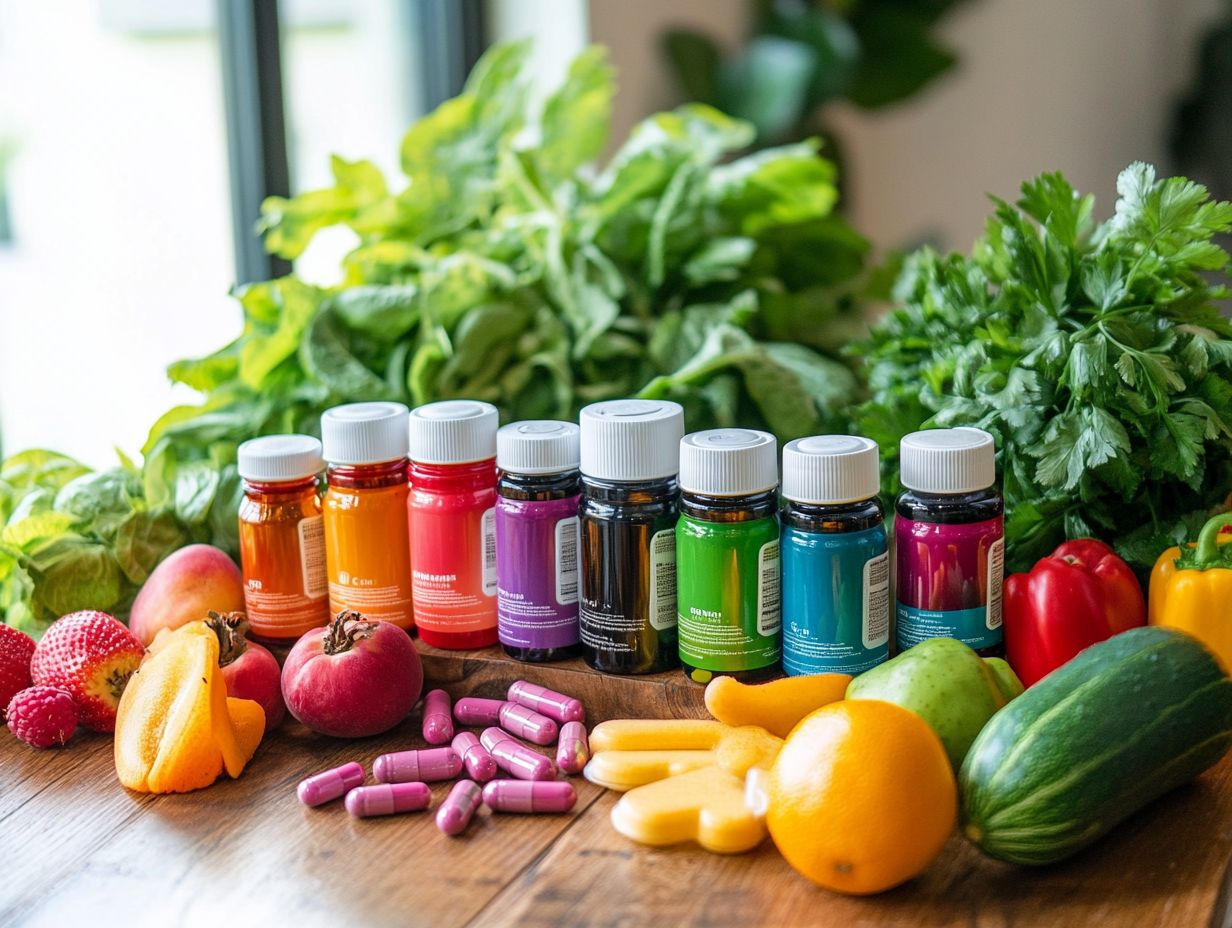 Certified vegan supplements play a crucial role in ensuring a product’s ethical status and guaranteeing the absence of any animal-derived ingredients, which is essential for individuals following a strict vegan diet. This certification is often associated with higher quality and manufacturing standards for supplements. More consumers are increasingly seeking out these certifications, as they provide added assurance that the products they are using are not only safe but also produced with consideration for the environment and animal welfare. In a market that is becoming more health-oriented, consumers are eager to educate themselves about their wellness choices, and a reliable vegan certification fosters that confidence. By choosing brands that prioritize these principles, consumers contribute to a marketplace where ethical standards and accountability are paramount.
Certified vegan supplements play a crucial role in ensuring a product’s ethical status and guaranteeing the absence of any animal-derived ingredients, which is essential for individuals following a strict vegan diet. This certification is often associated with higher quality and manufacturing standards for supplements. More consumers are increasingly seeking out these certifications, as they provide added assurance that the products they are using are not only safe but also produced with consideration for the environment and animal welfare. In a market that is becoming more health-oriented, consumers are eager to educate themselves about their wellness choices, and a reliable vegan certification fosters that confidence. By choosing brands that prioritize these principles, consumers contribute to a marketplace where ethical standards and accountability are paramount.
2. Check for Third-Party Certifications
Third-party certifications play a crucial role in verifying the quality, potency, and safety of supplements, thereby providing consumers with confidence in their choices. Checking for these certifications ensures that the selected vegan supplements effectively meet health needs without harmful additives. These independent evaluations serve as a strong assurance that products adhere to stringent safety standards, fostering trust between manufacturers and consumers. By relying on credible organizations that test for contaminants and validate ingredient claims, individuals can make informed decisions about their health. This is particularly important in an industry where misleading labels can compromise consumer protection. Supplements backed by reputable third-party certifications often demonstrate enhanced bioavailability and potency, ultimately leading to better health outcomes. Consumers can feel secure knowing they are investing in quality products that support their wellness journey.
3. Consider Your Individual Needs
When choosing vegan supplements, it is essential to consider your individual dietary needs and health conditions, as these requirements can vary based on age, sex, lifestyle, and health status. Health practitioners can provide personalized guidance to ensure that your supplement needs are adequately met. Factors such as activity level, pre-existing medical conditions, and genetic predispositions can significantly influence the specific vitamins and minerals you may require. For instance, athletes might need additional protein and amino acids, while individuals with specific dietary restrictions may experience deficiencies in certain nutrients. Consulting with qualified nutritionists or dieticians can help establish a personalized supplement regimen designed to address any deficiencies and promote overall health. Personalized recommendations ensure that individuals are not merely taking generic supplements but are actually benefiting from products tailored to their unique physiological and lifestyle factors.
What Are the Potential Risks of Taking Vegan Supplements?
Vegan supplements can offer significant health benefits; however, they may also pose risks if not used correctly, such as overdosing on specific nutrients or interacting with medications. Understanding the potential dangers associated with vegan supplements is crucial for making informed decisions about their use within a vegan lifestyle.
1. Overdosing on Certain Nutrients
Overdosing on certain nutrients, such as vitamin D and iron, can lead to toxicity and other adverse effects, posing serious health risks. For vegans, it is crucial to adhere to recommended dosages and regularly monitor their supplement intake, along with maintaining a well-balanced diet and understanding their dietary needs, to prevent overdosing. Excessive vitamin D can result in hypercalcemia, which may cause symptoms like nausea, weakness, and even kidney failure. Similarly, while iron is an essential component of hemoglobin, too much iron can lead to iron overload, potentially damaging the liver, heart, and other organs. Regular blood tests to check nutrient levels and consultations with healthcare professionals about proper supplementation are essential. By being aware of these risks and following dosage guidelines, individuals can better ensure their health and wellness while adhering to a vegan lifestyle.
2. Interactions with Medications
The complete range of interactions between medications and dietary supplements is not yet fully understood for most supplements. Certain dietary supplements may interact with medications, potentially reducing their effectiveness or causing harmful side effects. Understanding health conditions and health risks associated with nutrient supplementation is essential for safe use. Therefore, it is crucial for vegans to consult with healthcare professionals before starting any new supplement to ensure their safety and to verify that it does not interact with other medications they may be taking. For some dietary supplements, the extent of interaction with medications can be significant. For instance, St. John’s Wort, commonly used to treat mild to moderate depression, can diminish the effectiveness of selective serotonin reuptake inhibitors (SSRIs) like fluoxetine (Prozac) or paroxetine (Paxil) when taken together. Additionally, St. John’s Wort can reduce the effectiveness of birth control pills, making it essential to inform your doctor about all current medications and supplements to receive personalized supplement advice based on your specific health needs, which can include concerns about iron intake and calcium absorption. Not all dietary supplements are well-tested or of high quality, which underscores the importance of consulting health practitioners. Some supplements may not be safe or effective, and health professionals can provide guidance on your supplement regimen to avoid nutrient deficiencies and health risks. Thus, for vegans following a plant-based diet and seeking the benefits of healthier supplementation, it is best to rely on the guidance of a qualified healthcare professional to protect themselves from the risks associated with unsafe supplements, including potential nutrient gaps such as vitamin B12, omega-3 fatty acids, and vitamin D.
3. Contamination with Animal Products
Contamination with animal products in supplements poses a significant concern for those following a vegan diet, making it essential to select products from brands that can demonstrate their commitment to vegan integrity. Ensuring safety in supplements supports an individual’s dedication to ethical dietary choices and their nutrient requirements, such as getting enough zinc, iodine, and protein. The implications of contamination with animal-derived ingredients extend beyond dietary preferences; they can also impact health and well-being. When consumers opt for supplements with unclear sourcing and manufacturing processes, they risk accidental exposure to animal-derived ingredients that they aim to avoid for ethical reasons. Therefore, it is critical to ensure that your vegan multivitamin or other supplements like vitamin D3 come from trusted sources. This underscores the importance of conducting thorough research on brands and carefully reading labels to ensure that products align with personal values. Reputable companies prioritize transparency with their consumers, often providing third-party testing results for their products, which is particularly important for those committed to a vegan lifestyle and ensuring an adequate daily intake of essential nutrients like vitamin B12, iron, and calcium. Ultimately, prioritizing safety in supplement products fosters a healthier and more aligned approach to personal nutrition, especially in meeting daily nutrient requirements through fortified foods and whole-food diet options like nutritional yeast, that support immune function, healthy thyroid, and protein metabolism.

